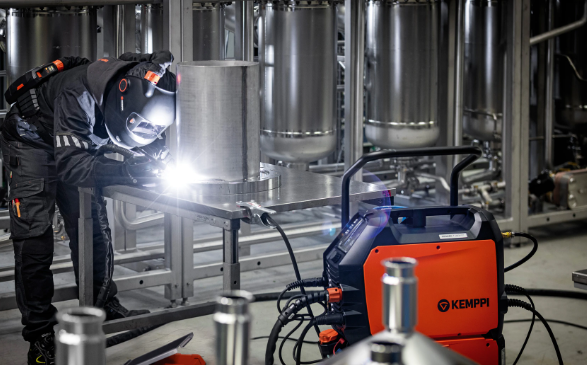(Akiit.com) Are you searching for a new welding machine but feeling unsure about which one will suit your needs? With so many options available, it’s easy to feel overwhelmed by the technical jargon and endless features. Let’s simplify things and focus on what actually matters.
1. Versatility
Welding isn’t a one-size-fits-all process, and a good machine should reflect that. Whether you’re working with mild steel, stainless steel, or aluminium, the ability to switch between different welding processes like MIG, TIG, and stick welding is a game-changer.
Some machines are designed to be multi-process, meaning they can handle multiple types of welding without requiring separate equipment. This versatility is especially valuable if you’re dealing with diverse projects or working in environments where flexibility is key.
Ask yourself: will your machine handle the variety of materials and welding techniques you use regularly? If the answer is no, you might end up limiting your capabilities—or worse, needing another machine sooner than you’d like.

2. Power Options and Output Range
One of the first things to consider is where you’ll be using your welding machine. Are you working on-site with limited power availability, or will you be in a workshop with access to industrial-grade power?
Modern welding machines often come with dual-voltage capability, allowing you to switch between 120V and 240V. This flexibility means you can plug into a standard household outlet or tap into higher power levels for more demanding tasks.
Equally important is the output range. For thinner materials, a lower amperage setting ensures precision without overheating. On the flip side, thicker materials require higher amperage. A machine with a broad output range ensures you can tackle everything from delicate fabrication to heavy-duty structural welding.
3. Portability Without Compromising Power
Gone are the days when welding machines were heavy, cumbersome beasts that needed two people to move. Today’s models, like these Kemppi welding machines, are sleek, compact, and designed for portability.
Lightweight welding machines are particularly useful if your projects take you from one site to another. Look for machines with ergonomic handles, durable casings, and a manageable weight. But portability shouldn’t mean sacrificing power—ensure the compact model you’re eyeing can still handle the full range of tasks you need.
This feature is a must for anyone who works in the field, whether it’s on construction sites, farms, or smaller workshops.
4. Ease of Use and Smart Features
Let’s face it—no one wants to wrestle with overly complicated equipment. Welding machines with user-friendly controls make a world of difference, especially if you’re not an expert or frequently switch between settings.
Many modern machines feature digital displays, allowing you to precisely adjust parameters like amperage and voltage. Some even offer pre-set options for common materials and thicknesses, taking the guesswork out of setup.
Don’t overlook smart technologies, either. Features like automatic voltage compensation and thermal overload protection can help maintain consistent performance while preventing damage to your machine. For those just starting out, some models include “beginner-friendly” modes that optimise settings automatically, helping you achieve professional results without a steep learning curve.
5. Durability and Build Quality
Your welding machine will likely face a variety of harsh conditions—think heat, dust, and rough handling. Investing in a machine with solid build quality ensures it can handle all of this without breaking down.
Look for features like reinforced casing, cooling systems, and weather-resistant designs. Machines built with industrial-grade components will last longer and require less maintenance, saving you from unexpected repair costs.
While it’s tempting to go for a cheaper option, a durable machine will pay off in the long run by providing consistent performance and reliability. Ask yourself: is this machine built to last, or will it give out when I need it most?
6. Cost Efficiency and Value for Money
Of course, price is always a factor, but it’s not just about finding the cheapest option. A good welding machine is an investment, and focusing on value for money is crucial.
Think about what’s included. Does the machine come with essential accessories like a welding torch, cables, or a regulator? If not, you might need to factor these into your budget. Also, consider the long-term costs—machines with energy-efficient designs can save you money on power bills, while low-maintenance models reduce ongoing expenses.
You don’t need to break the bank, but spending a bit more on a machine with the right features will often pay off in better performance and fewer headaches.
What Features Matter Most to You?
Choosing the right welding machine comes down to your specific needs and the kind of work you do most often. Are you prioritising versatility because you work with a variety of materials? Or is portability at the top of your list because you’re always on the move?
Whatever your priorities, focusing on features like power options, smart controls, and durability will ensure your investment works hard for you. By narrowing your options based on these six features, you’ll be well-equipped to find a machine that ticks all the boxes.
Whether you’re a professional welder or just starting out, having the right tools is essential for success. Take the time to evaluate your needs and match them to the features that matter most. A well-chosen welding machine can make every project smoother, faster, and more enjoyable.
A Strong Foundation for Every Project
Ultimately, a welding machine is more than just a piece of equipment—it’s the backbone of your work. The right machine will not only meet your current needs but also grow with you as you take on bigger and more complex projects.
By considering these six features, you’re not just buying a tool—you’re making an investment in your craft. Choose wisely, and your welding machine will be a reliable partner for years to come.
Staff Writer; Peter James









Leave a Reply